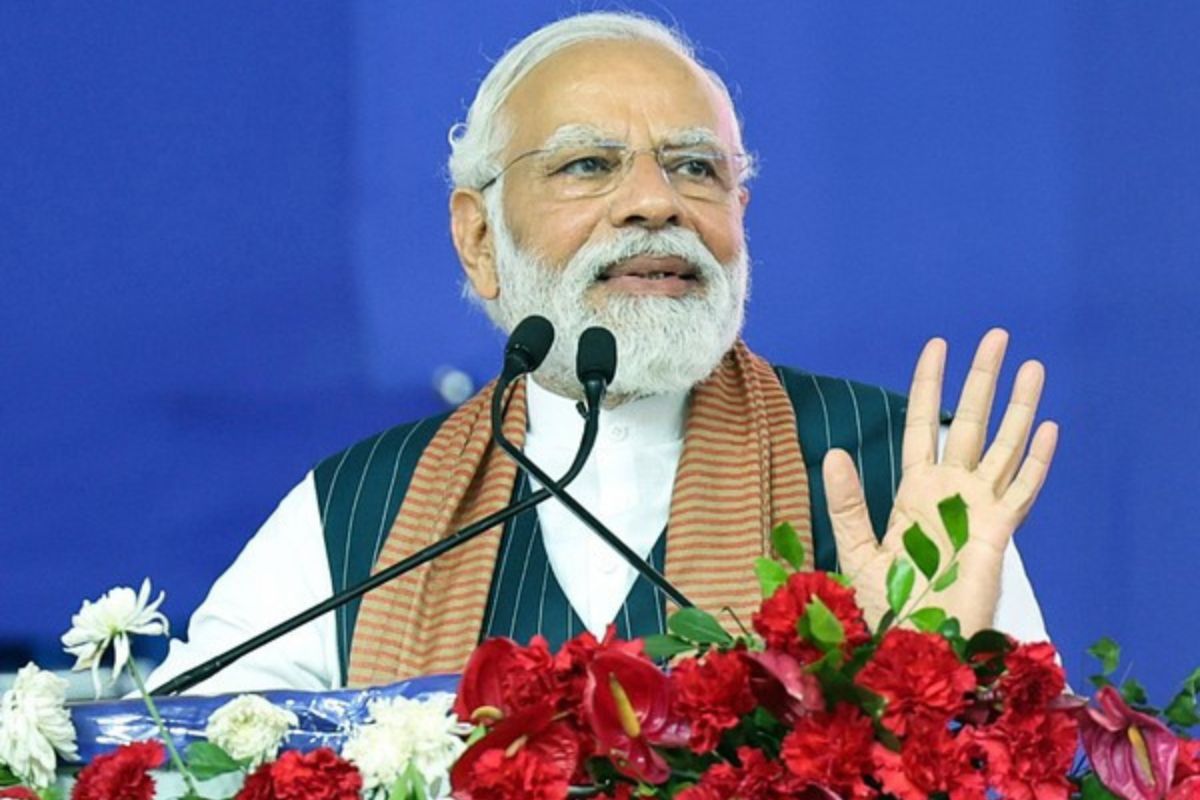Ministers undergo RT-PCR test before attending Cabinet meeting as govt tightens COVID-19 protocol
"The COVID-19 RT-PCR test is now mandatory before meeting the Prime Minister," a well-placed source said.
Narendra Modi was addressing a gathering after launching projects worth around Rs 4,400 crore in Gandhinagar, Gujarat.
Statesman News Service | New Delhi | May 12, 2023 8:25 pm

Prime Minister Narendra Modi (Photo: ANI)
Prime Minister Narendra Modi on Friday said that the government’s approach of hundred per cent saturation in covering beneficiaries under welfare schemes, irrespective of religion or caste, ensured true secularism and exclusion of all corruption and discrimination.
Narendra Modi was addressing a gathering after launching projects worth around Rs 4,400 crore in Gandhinagar, Gujarat. The projects were for urban development, water supply, road and transport department and mines and minerals departments.
Advertisement
He said social justice takes place when there is work for the benefit and good of all, and the rights of hundred per cent people are ensured. When basic necessities of the poor are met, they are content and their confidence goes up.
Advertisement
The prime minister said about 40,000 poor families had today acquired pucca houses and he found their confidence had gone up when he interacted with them. He expressed satisfaction at the pace of development in Gujarat under the government formed after the recent election.
Mentioning the recent pro-poor Gujarat Budget of Rs 3 lakh crore, he said benefits to people under various initiatives of the State Government showed the double engine government of Gujarat is working with double speed.
He said that people have been experiencing unprecedented development in the last nine years. There was a time when even basic facilities were rare for the citizens, he said. The country is coming out of that despondency, he said. Nation building for him is an ongoing ‘Maha Yagna,” he said.
Highlighting the differences between the work culture of the present government and governments of the past, he said “The country cannot transform its fate and become a developed nation by moving forward on the path of failed policies.”
The prime minister said roughly 75 per cent of homes in rural areas lacked the facility of a toilet 10 years back, even though policies were already in place. After 2014, the Prime Minister said, the government did not limit itself to only providing a roof for the poor but turned the homes into a basis for tackling poverty and a medium for strengthening their dignity.
“Under Pradhan Mantri Awas Yojana (PMAY), the beneficiaries have a say in the construction of houses where the government transfers the financial aid directly into their bank accounts”, the Prime Minister said as he touched upon the geo-tagging of such houses.
The Prime Minister said that the houses being constructed under the PMAY are a package of many schemes. A house has a toilet under Swachh Bharat Abhiyan, electricity connection under Saubhagya scheme, free LPG connection under Ujjwala scheme, piped water under JJM, he said. He said apart from these things, free medical treatment and free ration are also working as a security shield for the poor.
The prime minister touched on women empowerment and said about four crore houses have been handed over to poor families and 70 per cent of which are registered in the name of the women.
The prime minister said that the government is working keeping in mind the challenges of the future and the growing urbanization in the country. He mentioned that more than a thousand houses in Rajkot have been constructed using modern technology thereby consuming less time and money, and are equally safe.
He said that the experiment under the Light House Project has been carried out in six cities of the country where technology has helped in building cheaper and modern houses. He also assured that such houses are going to be available to the poor in the coming times.
The prime minister elaborated on the steps to remove bad practices and cheating in the real estate sector that had caused a lot of hardships for poor and middle-class families. The RERA Act has provided legal security to middle-class families for getting the promised facilities when purchasing a house, he said.
He said there was an unprecedented budget subsidy for housing loans for middle-class families. In Gujarat, five lakh families got assistance worth Rs 11,000 crore. The Prime Minister said in the 25 years of Amrit Kaal specially tier-2 and tier-3 cities will give pace to the economy. “Today, we are giving equal emphasis on Ease of Living and Quality of Life in urban planning,” the prime minister said.
Advertisement
"The COVID-19 RT-PCR test is now mandatory before meeting the Prime Minister," a well-placed source said.
Former Bihar chief minister Lalu Prasad Yadav on Wednesday celebrated his 78th birthday along with family members, party leaders and workers here. He also cut a 78-pound cake with a sword to mark the occasion.
A bench comprising Chief Justice BR Gavai and Justice Augustine George Masih heard more than four hours of submissions from senior advocates Kapil Sibal, Rajeev Dhavan, Abhishek Manu Singhvi, CU Singh, and Huzefa Ahmadi.
Advertisement
